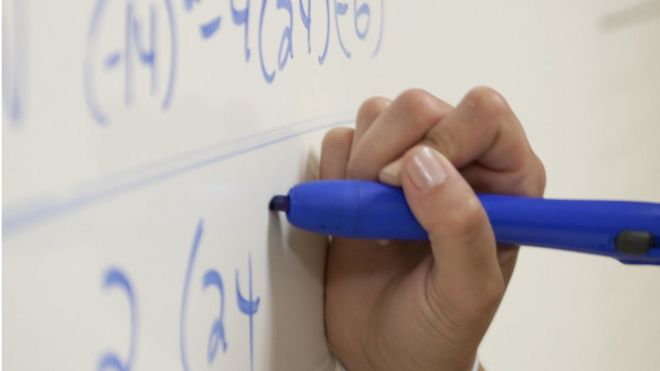
It will take a decade to bring maths teaching in England up to world-beating standards, say subject experts.
A report from the Advisory Council on Mathematics Education (ACME) suggests teachers responsible for maths in both primary and secondary schools need better qualifications and training.
Without more good teachers efforts to improve skills were "built on sand", said report author Robert Barbour.
The government said it had prioritised maths teacher recruitment.
Global school rankings published in May this year put UK pupils 20th in the world for maths and science.
ACME notes 94% of initial teacher training in England was rated good or outstanding by Ofsted last year but urges "a step change" for maths teacher training to "meet the challenge of England becoming a world-class mathematics education system".
"We are not at the bottom, we are not a basket case," said Mr Barbour, who added that he felt maths teaching in England should "aspire to level with the best".
The authors compared maths teacher training in England with four of the world's most successful education systems: Singapore, Shanghai, Germany and Massachusetts.
In particular, all trainee teachers who will teach maths should have higher qualifications than at present, both at primary and secondary level, they argue.
All primary teachers teach maths, argues the report, but most have not studied the subject since they were 16.
Currently trainee primary teachers must have at least C at GCSE maths but, in the long-term, the authors want all trainee primary teachers to have studied maths to 18.
The government's new core maths qualifications, which encourage teenagers to use maths in real situations, would be ideal, they argue.
The difficulty is "schools are finding they haven't got the teachers to offer core maths", said Mr Barbour.
At secondary level, the shortage of maths graduates means more trainees with related degrees such as economics should be encouraged into the subject with courses to enhance their mathematical knowledge, says the report.
But these courses can be variable in quality and need better regulation, said Mr Barbour.
The report also calls for better mathematics mentoring for trainee and newly qualified teachers at both primary and secondary level, with subject experts based in schools.
It also urges better professional development for fully qualified teachers.
The authors recognise these changes will take time.
"We can't flick a switch and say we will do this next year. It will take long term patient planning but it will have a huge impact," said Mr Barbour.
The National Association of Head Teachers said 10 years was too long to wait for more good maths teachers.
"The children in the system today won't see the benefits before they leave school," said general secretary Russell Hobby.
"The effectiveness of recruitment needs to be addressed immediately. For the teachers there are in the system today, it's vital that they have access to proper professional development to increase their expertise."
Lizana Oberholzer of the National Association of School Based Teacher Training said she supported higher maths standards for teachers - but said it was also important to attract trainees from a wider pool of graduates.
"It is key that we keep in mind that we need to make sure we develop people with maths skills appropriately and they might come to teaching from different walks of life."
The government said it had recruited more maths teachers this year than last, with the number and quality of teachers in England's schools "at a record high".
"We have removed the cap for schools and providers on training allocations for maths and increased the bursaries and scholarships available for postgraduate initial teacher training recruitment in maths, so that trainees with at least a 2:2 degree will receive £25,000," said a Department for Education spokesman.
"We have also pledged up to £67m to improve the skills of 15,000 existing non-specialist teachers and to recruit an additional 2,500 specialist maths and physics teachers over this parliament."
The government had also made more salaried training places available to encourage more career changers into teaching, said the spokesman.

No comments:
Post a Comment